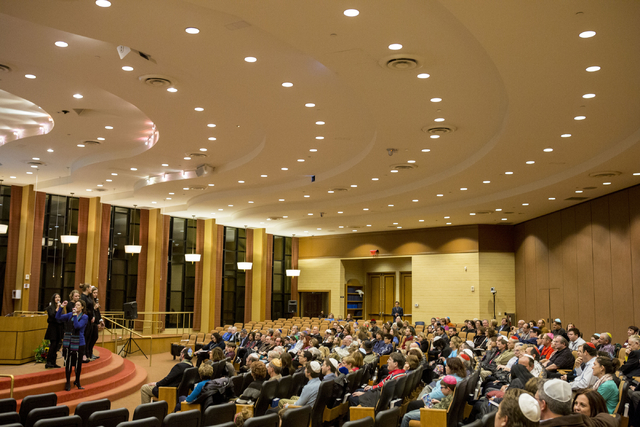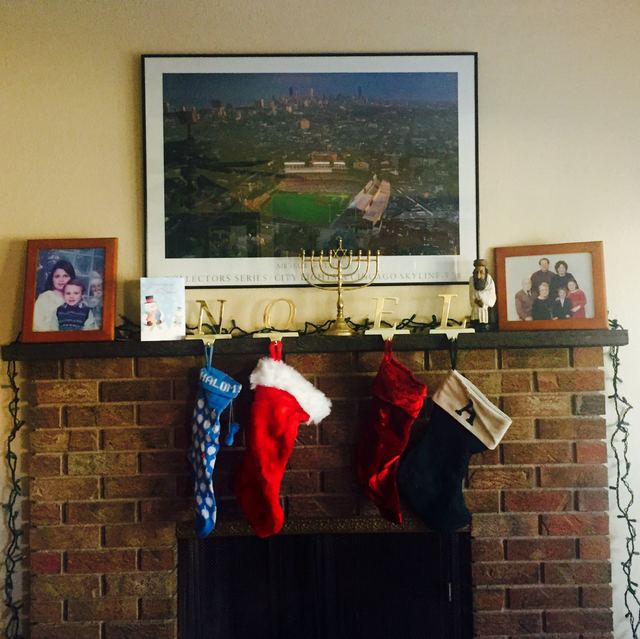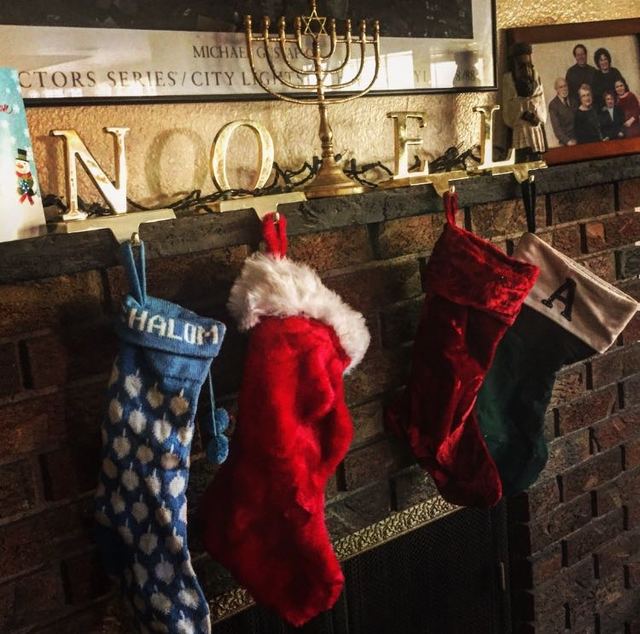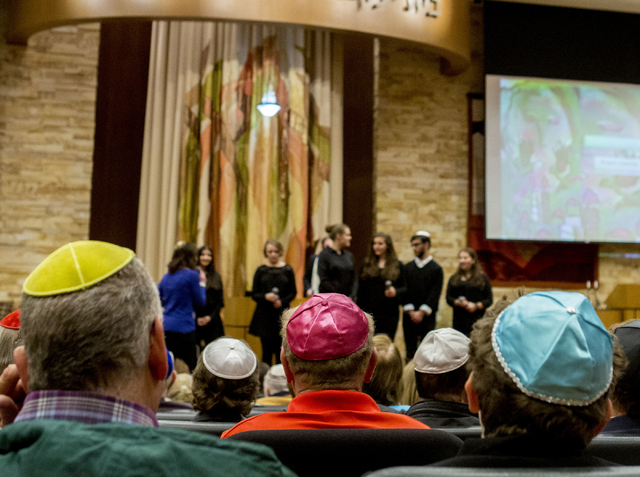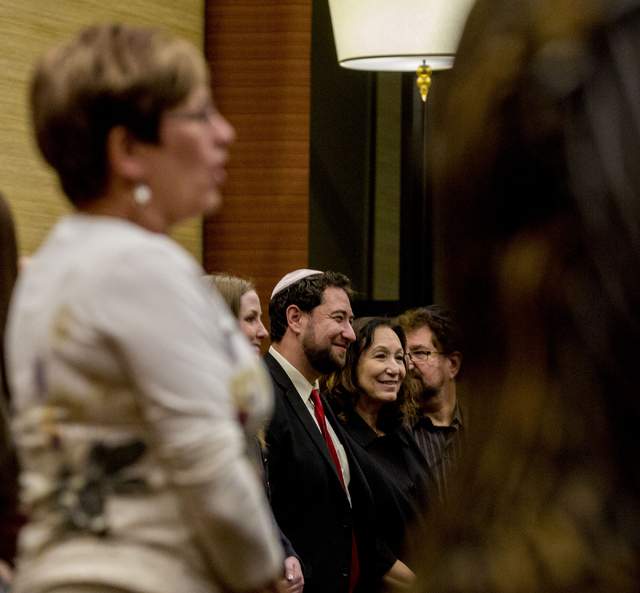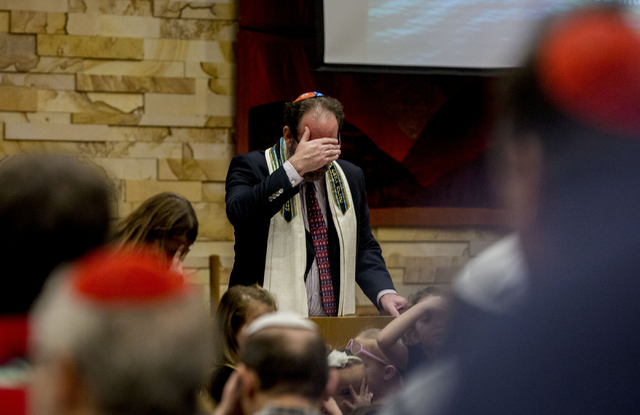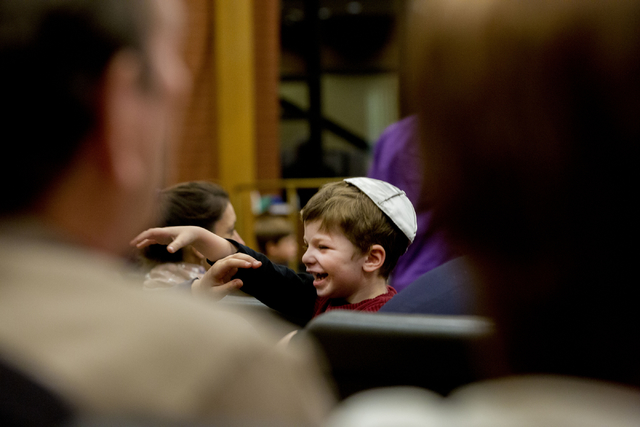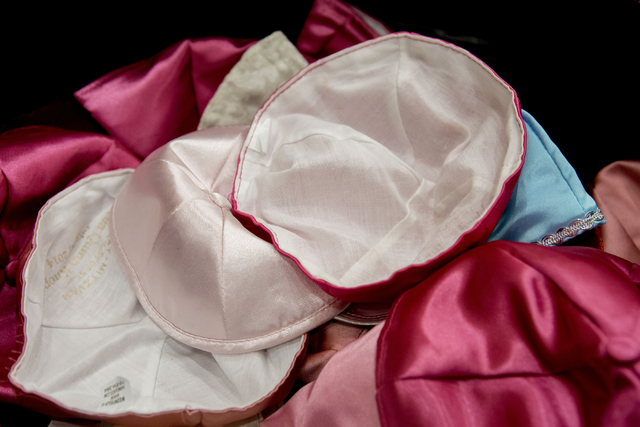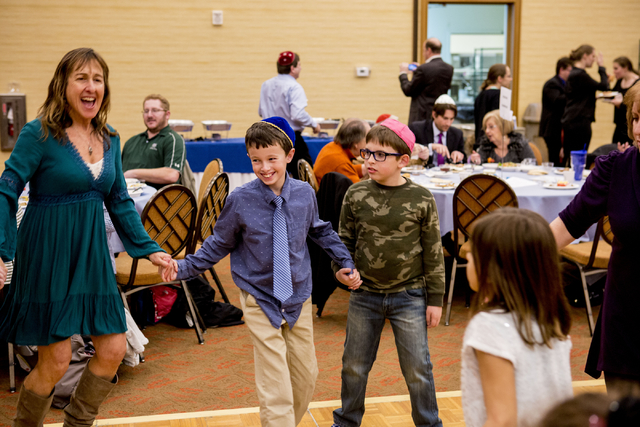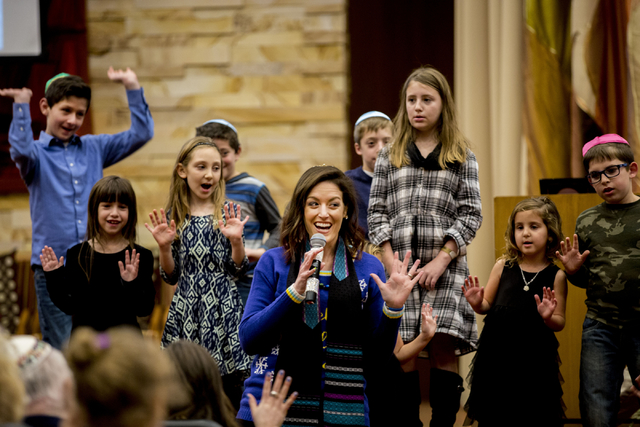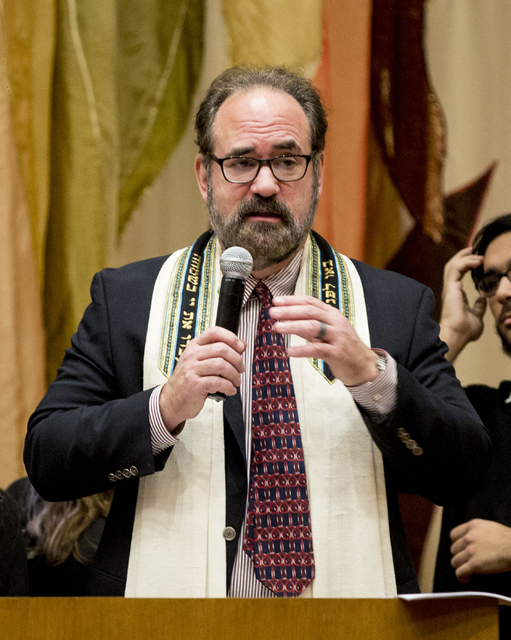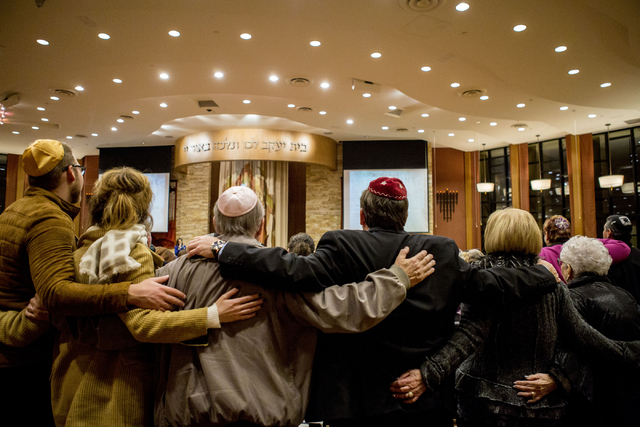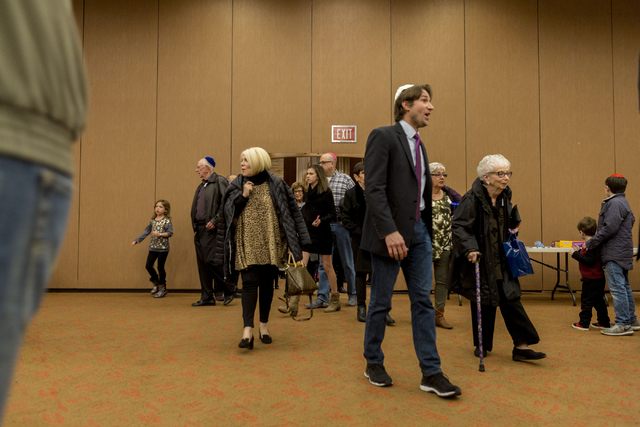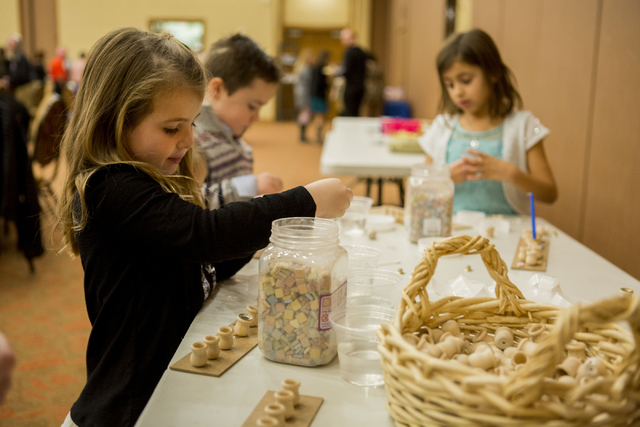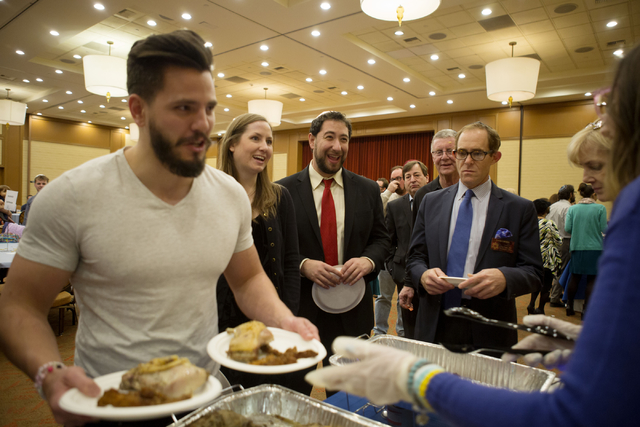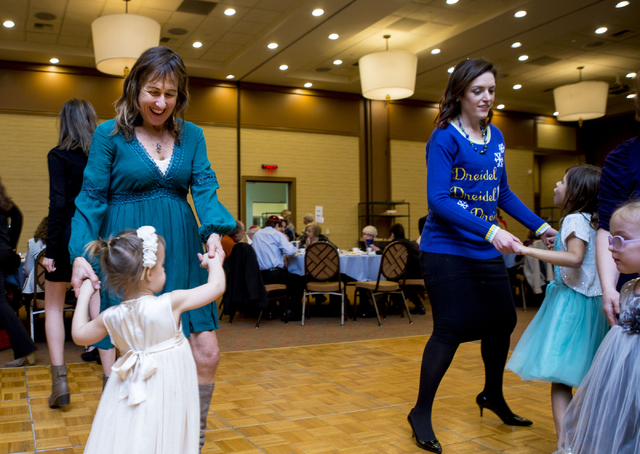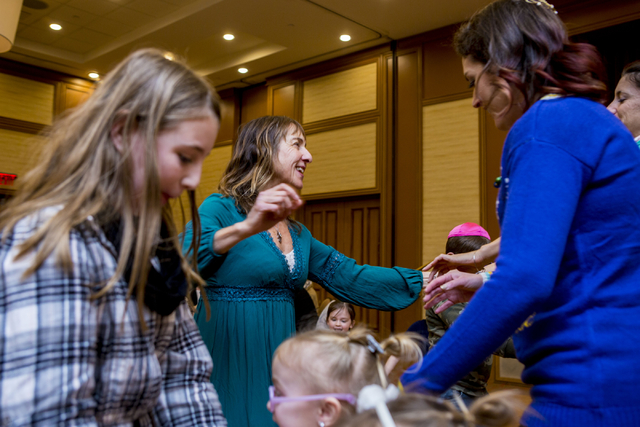First day of Hanukkah, falling on Christmas Eve, creates challenge for interfaith families
Sarah Niederman’s relationship with Santa Claus has always been complicated.
“We would go get our picture with Santa every year, and he’d say, ‘What do you want for Christmas?’ And I’d say, ‘Well, can I get this for Hanukkah, and can I get this for Christmas?’ and Santa would look at me like I was crazy.”
The daughter of a Jewish father and Catholic mother, Niederman grew up with a Christmas tree in one room and a menorah and Star of David decorations in another. Her mother, Sally Niederman, was determined to expose her children to both faiths with no pressure to choose one until they were older and ready to make a choice for themselves.
During a recent Friday Shabbat service, Congregation Ner Tamid’s Rabbi Sanford Akselrad stepped away from the podium, pulled up a chair and engaged in the second of his Compelling Conversations series. The topic: “Christmakah: Are We Becoming a Multi-Faith Society?”
Interacting with Roberta Sabbath, of the UNLV English department, Akselrad talked about how to balance the “December Dilemma” in increasingly interfaith homes.
Jodi Bromberg, president of InterfaithFamily, a national organization dedicated to empowering multifaith families exploring Jewish life, said the rate of intermarriage among non-Orthodox Jews who have married since 2000 is 71 percent.
“If you include Orthodox Jews in the numbers of Jews getting married since 2000, it drops to about 58 percent,” she said.
Bromberg said that most years Jewish/Christian couples face tense times trying to navigate different cultural or religious holiday traditions with immediate and extended families, but this year is likely to be worse.
“I think having Christmas Eve and the first night of Hanukkah being the same exact night has the potential to exacerbate that,” she said.
Akselrad said many families struggle in December.
“And the struggle is not just, well how do I make my Jewish child feel special in the light of Christmas, it’s what do I do in my own family when there is more than one religious tradition? How do we balance that out? How are we fair? How do we make everyone feel celebrated and important?”
While Akselrad said he feels it’s ideal to have one faith tradition, the reality is that families are increasingly choosing more than one.
“I’m not giving this as a suggestion. I’m describing what is,” he said. “One family may have a Christmas tree and a menorah, where in the old days they would probably have a Christmas tree or a menorah.”
The Niedermans are far from alone. “A Portrait of Jewish Americans,” a 2013 report by the Pew Research Center’s Religion &Public Life Project, found that 32 percent of Jews said they had a Christmas tree in their home. Putting up a tree is especially common among interfaith couples, where 71 percent said they had a tree.
In its 2013 survey, InterfaithFamily found that 98.7 percent of its 757 survey respondents raising Jewish children in interfaith families planned to celebrate Hanukkah, while 86.2 percent planned to participate in Christmas celebrations. The majority (99.1 percent) planned to celebrate Hanukkah at home, while 59.1 percent planned to celebrate Christmas at home. More (73.1 percent) planned to celebrate Christmas at the home of relatives, while 25.9 percent planned to celebrate it in the homes of friends.
The survey also found that while only 9.9 percent of respondents participating in Christmas see their Christmas celebrations as religious, 24.5 percent see participating in Hanukkah as deeply or fairly religious. More than 88 percent said their Christmas celebrations were entirely or mostly secular, while 26.8 percent saw their Hanukkah celebrations as mostly or entirely secular. More than 73 percent of respondents think participating in Christmas celebrations will not affect their children’s Jewish identity.
Niederman said she felt celebrating both holidays was a part of her identity. She’s also quick to point out that she and her brother weren’t rolling in holiday gifts.
“My parents separated the presents out so that we weren’t spoiled children,” she said. “We didn’t get big presents every day of Hanukkah and then get a whole bunch of presents on Christmas.”
Rabbi Malcolm Cohen of Temple Sinai said that whether families choose to celebrate Hanukkah or Christmas or both, it’s important to “properly engage with the traditions,” to get “to the guts of the respective holidays. Don’t just rely on the superficial shiny sheen of the holiday.”
“For Jews, the meaning is the durability of the Jewish people, fighting their oppressors and rededicating their temple and also challenging themselves on the issue of assimilation,” he said.
Cohen said resisting assimilation and the glitz of Christmas can be difficult.
“Christmas is really shiny. It’s hard for kids to resist the allure of all that stuff,” he said.
Akselrad said Hanukkah, though it isn’t one of the most important Jewish holidays, is still a chance to shine. “I think for those people who really care about Jewish identity, Jewish survival, it’s important to take Hanukkah as an opportunity for Jewish pride in culture.”
The candles of the menorah provide a means to literally let Jewish light shine.
“A lot of people will take their menorah and sit it on their table, but that’s not the actual commandment,” Akselrad said. “It’s to place it in the window sill. The reason it went from the window sill to the inside is because of anti-Semitism. People were afraid to express their Jewishness publicly, so it went inside. But we who are alive today should be proud.”
“So you’re saying that how we as individuals choose to be Jews can carry a message to our children and our grandchildren and our families?” Sabbath asked Akselrad.
Akselrad said, “Even more to the point, not choosing is a choice.”
“Some people choose not to do anything because they have more than one religious tradition, or they confuse the kids by trying to make up a pseudo collection of religious traditions, or they don’t know enough themselves so maybe they know enough to have latkes and make dreidels, and that’s it. But those little items aren’t enough to ensure the vitality of the religion and the holiday celebration. So I am encouraging people to learn more and to do more.”
Akselrad said many in the younger generation know little about the holidays beyond a few traditions they shared with parents and grandparents.
“I want to just remind people who happen to be grandparents that your role in helping negotiate Christmakah can not be overstated,” he said. “Teach them. Enable them. Make sure they know the cooking recipes. Make sure they know how to make the decorations. Make sure they own the holidays. As much as you, as a grandparent, want to be that source of wisdom and feel needed and important, you are, but when you do it hand-in-hand with a grandchild or child, so that that tradition is passed on in a way that Jewish continuity is ensured, that really is ultimately what the story of Hanukkah is all about. Is it not?”
Sarah Niederman, now 23, appreciates that both her parents passed on holiday traditions. It’s only been in the past year that she finally made the choice to practice Judaism. But she doesn’t see an end to her complicated relationship with Christmas.
“I am currently dating and very much in love with a Christian man,” she said. “And we have plans to hopefully get married and have kids someday.”
If they do, she hopes to raise her children the same way she was, with both holidays and a choice they can make on their own.
“If they feel like going to church every Sunday is the choice for them, that’s wonderful,” she said. “If they feel like celebrating Shabbat every Friday night is how they want to live their lives, that’s great.”
And if they want to do both?
“That’s great, too,” she said.



